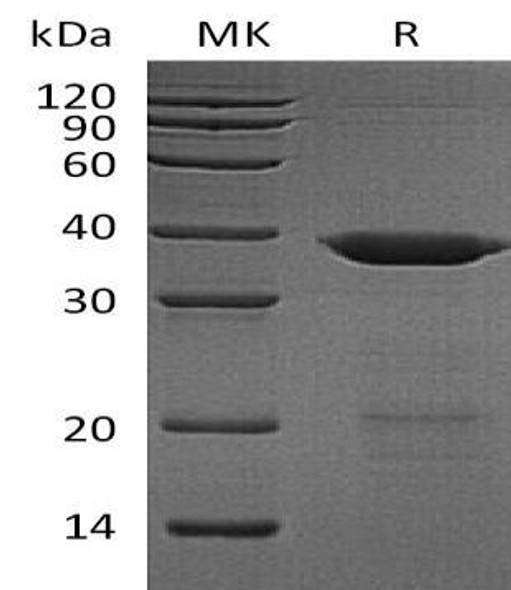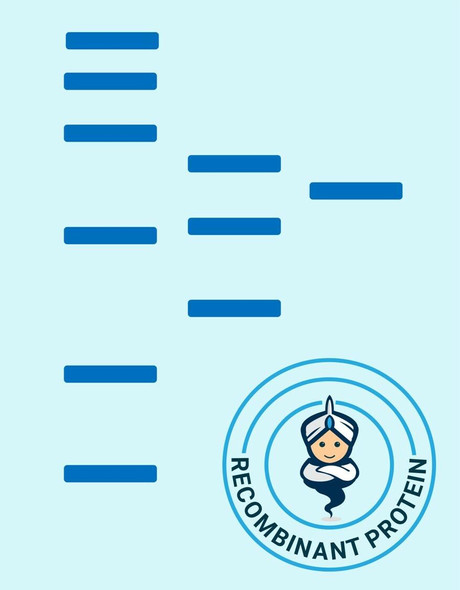Enzymes Recombinant Proteins
Human UBE2K Recombinant Protein (RPPB2382)
- SKU:
- RPPB2382
- Product Type:
- Recombinant Protein
- Species:
- Human
- Uniprot:
- P61086
- Research Area:
- Enzymes
Description
| Product Name: | Human UBE2K Recombinant Protein |
| Product Code: | RPPB2382 |
| Size: | 10µg |
| Species: | Human |
| Target: | UBE2K |
| Synonyms: | HIP2, Huntingtin Interacting protein 2, HYPG, Ubiquitin-conjugating enzyme E2-25K kDa, Ubiquitin-protein ligase, Ubiquitin carrier protein, LIG, HIP-2, E2(25K), DKFZp686J24237, OTTHUMP00000218440, EC 6.3.2.19. |
| Source: | Escherichia Coli |
| Physical Appearance: | Sterile Filtered clear solution. |
| Formulation: | The UBE2K protein solution (1mg/1ml) is formulated in 20mM Tris-HCl buffer (pH7.5) 1mM DTT, 50mM NaCl, and 10% glycerol. |
| Stability: | Store at 4°C if entire vial will be used within 2-4 weeks.�Store, frozen at -20°C for longer periods of time.Please avoid freeze thaw cycles. |
| Purity: | Greater than 95.0% as determined by: (a) Analysis by RP-HPLC.(b) Analysis by SDS-PAGE. |
| Amino Acid Sequence: | MRGSHHHHHH GMASMTGGQQ MGRDLYDDDD KDRWGSMANI AVQRIKREFK EVLKSEETSK NQIKVDLVDE NFTELRGEIA GPPDTPYEGG RYQLEIKIPE TYPFNPPKVR FITKIWHPNI SSVTGAICLD ILKDQWAAAM TLRTVLLSLQ ALLAAAEPDD PQDAVVANQY KQNPEMFKQT ARLWAHVYAG APVSSPEYTK KIENLCAMGF DRNAVIVALS SKSWDVETAT ELLLSN |
UBE2K belongs to the ubiquitin-conjugating enzymes family which take part in many cellular processes such as selective protein degradation, DNA repair, cell cycle control, and sporulation. In this mechanism, the ATP-coupled activation and subsequent ligation of ubiquitin are catalyzed by separate enzymes functionally linked by ubiquitin carrier protein UBC1. In addition, UBE2K is involved in Alzheimer's disease, Huntington's disease and antigen processing through its interaction with amyloid-b, huntingtin, and MHC-heavy chain proteins.
UBE2K produced in E.Coli is a single, non-glycosylated polypeptide chain containing 236 amino acids (1-200a.a.) and having a molecular mass of 26.5kDa.UBE2K is fused to a 36 amino acid His-tag at N-terminus & purified by proprietary chromatographic techniques.
| UniProt Protein Function: | UBE2K: Accepts ubiquitin from the E1 complex and catalyzes its covalent attachment to other proteins. In vitro, in the presence or in the absence of BRCA1-BARD1 E3 ubiquitin-protein ligase complex, catalyzes the synthesis of 'Lys-48'-linked polyubiquitin chains. Does not transfer ubiquitin directly to but elongates monoubiquitinated substrate protein. Mediates the selective degradation of short-lived and abnormal proteins, such as the endoplasmic reticulum-associated degradation (ERAD) of misfolded lumenal proteins. Ubiquitinates huntingtin. May mediate foam cell formation by the suppression of apoptosis of lipid-bearing macrophages through ubiquitination and subsequence degradation of p53/TP53. Proposed to be involved in ubiquitination and proteolytic processing of NF-kappa-B; in vitro supports ubiquitination of NFKB1. In case of infection by cytomegaloviruses may be involved in the US11-dependent degradation of MHC class I heavy chains following their export from the ER to the cytosol. In case of viral infections may be involved in the HPV E7 protein- dependent degradation of RB1. Interacts with RNF138/NARF. Interacts with BRCA1. By aggregated low-density lipoprotein. Expressed in all tissues tested, including spleen, thymus, prostate, testis, ovary, small intestine, colon, peripheral blood leukocytes, T-lymphocytes, monocytes, granulocytes and bone marrow mononuclear cells. Highly expressed in brain, with highest levels found in cortex and striatum and at lower levels in cerebellum and brainstem. Belongs to the ubiquitin-conjugating enzyme family. 2 isoforms of the human protein are produced by alternative splicing. |
| UniProt Protein Details: | Protein type:Ubiquitin ligase; Ligase; Ubiquitin conjugating system; EC 6.3.2.19 Chromosomal Location of Human Ortholog: 4p14 Cellular Component: intermediate filament cytoskeleton; cytoplasm; nucleus; actin cytoskeleton Molecular Function:protein binding; small conjugating protein ligase activity; ubiquitin protein ligase binding; ubiquitin-protein ligase activity; ATP binding; ligase activity Biological Process: ubiquitin-dependent protein catabolic process; proteasomal ubiquitin-dependent protein catabolic process; regulation of proteasomal ubiquitin-dependent protein catabolic process |
| NCBI Summary: | The protein encoded by this gene belongs to the ubiquitin-conjugating enzyme family. This protein interacts with RING finger proteins, and it can ubiquitinate huntingtin, the gene product for Huntington's disease. Known functions for this protein include a role in aggregate formation of expanded polyglutamine proteins and the suppression of apoptosis in polyglutamine diseases, a role in the dislocation of newly synthesized MHC class I heavy chains from the endoplasmic reticulum, and involvement in foam cell formation. Multiple transcript variants encoding different isoforms have been identified for this gene. [provided by RefSeq, Jul 2008] |
| UniProt Code: | P61086 |
| NCBI GenInfo Identifier: | 46577658 |
| NCBI Gene ID: | 3093 |
| NCBI Accession: | P61086.3 |
| UniProt Related Accession: | P61086 |
| Molecular Weight: | |
| NCBI Full Name: | Ubiquitin-conjugating enzyme E2 K |
| NCBI Synonym Full Names: | ubiquitin conjugating enzyme E2 K |
| NCBI Official Symbol: | UBE2K�� |
| NCBI Official Synonym Symbols: | LIG; HIP2; HYPG; UBC1; E2-25K�� |
| NCBI Protein Information: | ubiquitin-conjugating enzyme E2 K |
| UniProt Protein Name: | Ubiquitin-conjugating enzyme E2 K |
| UniProt Synonym Protein Names: | Huntingtin-interacting protein 2; HIP-2; Ubiquitin carrier protein; Ubiquitin-conjugating enzyme E2-25 kDa; Ubiquitin-conjugating enzyme E2(25K); Ubiquitin-conjugating enzyme E2-25K; Ubiquitin-protein ligase |
| Protein Family: | High-potential iron-sulfur protein |
| UniProt Gene Name: | UBE2K�� |
| UniProt Entry Name: | UBE2K_HUMAN |






